I didn’t ever expect to be planning the 18th birthday party for my twin sons. Because doctors said they wouldn’t be around to celebrate it.
Andrew is dad to twins Freddie and Louie. They are among only seven or eight youngsters in the UK living with CLN 5, a rare form of Batten Disease. As far as is known, they are the only twins in the world with this specific genetic disorder.
Andrew shares his own personal story of life with the twins and how their personalities shine through.
Read his story at the link below
Freddie and Louie are among only seven or eight youngsters in the UK living with CLN 5, a rare form of Batten Disease. As far as I know, they’re the only twins in the world with this specific genetic disorder that I was told would claim their lives as young teenagers.
Born early at 34 weeks, diagnosed with severe non-verbal autism aged two and Batten Disease at five, they’re blind, epileptic and wheelchair bound.
Typically, lads are late developers. So, I wasn’t too concerned when they didn’t start walking until 21 months. And when Louie kept bumping into lampposts on holiday at the age of three, I shrugged it off as the mishaps of a ‘clumsy daft lad’.
Progressive vision loss in early childhood is a characteristic of Batten Disease. I fixed a Perspex panel to our TV screen when the boys began banging their heads against it in frustration at only being able to hear – and not see – Postman Pat. And it felt like I was banging my head against a brick wall when the diagnosis of CLN5 arrived in 2009.
Where was the research and medication that would deliver reassurance and hope? The answers painted a picture of neglect and under-investment.
And then we found the BDFA – a lifeline of expertise, advocacy, and support. At a BDFA conference in 2012, we learned about research into CLN1, 2 and 3 – and were told that there was no funding for CLN 5. I’ve never been one to accept the status quo, and certainly not when it comes to the lives of my children.
I was told it would take around £20,000 to kick-start a research project. I challenged myself to raise the first £1,000 by running a marathon. By the time I’d pulled on my trainers, the total had topped £10,000. Ten years later, with incredible support from family, friends and our community, we’ve raised £250,000. It’s funding four research projects with Great Ormond Street Hospital, UCL and Cardiff University.
Like all brothers, they wind each other up. They have their own distinct personalities: Louie’s a bit of a rogue – the kind of lad you wouldn’t want your daughter to bring home – while Freddie’s a little more laidback, the boy you would want your daughter to go out with.
Their mood in the morning dictates what we’re doing during the day. If they’re cheerful, we’re off to the hydro-pool for a dip or the park for a walk. They’re like a pair of pied pipers, attracting strangers who want to chat to us and make a fuss.
And, wherever we are, there must be music. We have a herb garden kitted out with speakers – it provides sensory comfort. The boys are also part of the Amber Trust, a charity that brings music into the lives of youngsters living with complex needs. Sometimes it takes my boys 20 minutes to hit a single key on a piano. But when they do, the joy on their faces is priceless.
I cherish these little wins because they’re an antidote to the more challenging activities, such as the inevitable messy moments. I recall changing their nappies as toddlers and dreading the prospect of replacing their soiled pads as teenagers. The anticipation proved worse than the reality. Mealtimes are easier too, now they’re PEG fed. On the face of it, this is a grim milestone: your child can no longer swallow, so blended food needs to be pumped directly into the stomach. In reality, I no longer have the trauma of the boys choking on their food or rejecting their medication – and I know they’re getting the nourishment they need.
It remains tough, though. And blokes are often overlooked when it comes to parents of severely disabled children. Also, if we’re being truthful, we’re less likely to open up about our feelings and seek help – whether that’s practical guidance or for our own mental wellbeing.
I’ve become a trained BDFA ‘Dad Befriender’. I host Zoom catch-ups with other fathers to share our experiences, tips and tales. Knowing there are others on the same journey is a source of comfort – even though none of us knows what the future holds.
I do know that my boys are 18 in September – and they’re going nowhere soon. Well, perhaps to the bar to buy me a birthday party pint.

